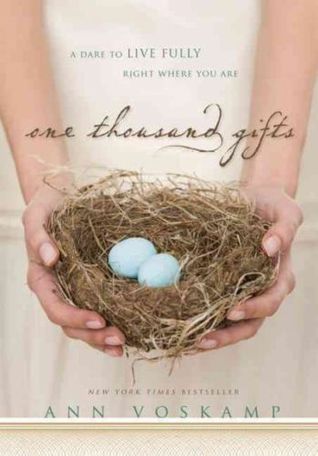The forty-second book I read in 2016 is one of those books that was everywhere when it was new. EVERYWHERE. It spawned: a study guide, a devotional, a "selections from" if you just weren't up to reading the whole thing, a copy in baby-blue imitation leather with a ribbon bookmark, not one but two Christmas-themed companion products, a ... DVD? really? Okay. And I did not buy it. I so did not buy it. I did not buy it with conviction. It was too popular, and I did not trust it.
Well, now, five years later, I looked it up in Half Price Books, figuring that the malign influence of its ubiquity must have dissipated, at least in part, and I have finally read One Thousand Gifts: A Dare to Live Fully Right Where You Are by Ann Voskamp. For those of you who, like me, have avoided it (or, unlike me, don't live in the evangelical subculture where it was impossible to miss), the author, Ann Voskamp, with a house full of kids, a bank account full of farm-based anxiety, and a haunting childhood tragedy hanging over her head, was challenged by a friend to list one thousand things for which to be thankful -- and actually to be thankful for them, not in a rote "yes, lots of people in the world are worse off than I am" way, but sincerely thanking God for each and every one of them. She found that it transformed her perspective on life, changing her default mode from defensive worry to enthusiastic embrace of each moment.
There is some really good stuff in here, particularly in the early chapters, including commentary on 2 Kings chapter 20 by her bereaved brother-in-law that I copied into my Bible notes. There's also the reminder that being thankful because things could have been worse doesn't help when things are the worst: if her son escaping permanent disfigurement after a serious accident is the grace of God, then what is there to tell the family whose son died in an accident the same day?
The language is really dense, almost twee. It's like Gerard Manly Hopkins for over two hundred pages of prose. I occasionally had to stop and take a break from hacking my way through the poetic expressions. And, frankly, there are times I think she goes too far: when one child throws toast at another and rages upon being reprimanded, "Why don't you ask what he did to me first?" I have no interest in taking his words as a deserved rebuke. I think the correct parental answer is "I don't care who did what to whom when; using food as a projectile weapon is never appropriate," and I don't apologize for it.
At the end, however, I agree with Voskamp's critics who say she goes too far in describing her intentional gratitude as "making love to God." There is an orthodox window for erotic language applied to man's relationship to God that is almost completely filled by some interpretations of Song of Solomon and the description of the church as the Bride of Christ. Where I believe Voskamp steps over the line into well-intentioned heresy is her statement that she (we) can know God as Adam knew Eve. No, the church is the Bride of Christ, not the husband. In relation to God, we are all feminine, receptive. We are never the active seeker, but the lost one who is sought. At best, we can know God as Eve knew Adam, but even the Bible's marital language puts the consummation at the end of days. Ecstatic union before the Marriage Supper of the Lamb is illegitimate.
Thursday, November 24, 2016
Subscribe to:
Post Comments (Atom)
Blog Archive
-
▼
2016
(73)
-
▼
November
(9)
- Book review: Conspirata by Robert Harris
- Book review: Emma by Alexander McCall Smith
- Book review: The Wright 3 by Blue Balliett
- Book review: Messenger of Truth by Jacqueline Wins...
- Book review: Chasing Vermeer by Blue Balliett
- Book review: One Thousand Gifts by Ann Voskamp
- Book review: The Story of the Trapp Family Singers...
- Book review: Leepike Ridge by N. D. Wilson
- Book review: Jeeves and the Wedding Bells by Sebas...
-
▼
November
(9)
Labels
- Agatha Christie (3)
- Alexander McCall Smith (23)
- apologia pro sua vita (49)
- Art Linkletter (29)
- Austeniana (10)
- bibliography (248)
- birthday (21)
- Charles Lenox (3)
- Christmas (29)
- deep thoughts by Jack Handy (16)
- Grantchester Mysteries (4)
- Halloween (10)
- high horse (55)
- Holly Homemaker (19)
- Hornblower (3)
- Inspector Alan Grant (6)
- Isabel Dalhousie (8)
- life-changing magic! (5)
- Lord Peter Wimsey (6)
- Maisie Dobbs (9)
- Mark Forsyth (2)
- Mother-Daughter Book Club (9)
- No. 1 Ladies' Detective Agency (14)
- photo opportunity (103)
- pop goes the culture (73)
- rampant silliness (17)
- refrigerator door (11)
- Rosemary Sutcliff (9)
- something borrowed (73)
- the grandeur that was (11)
- where the time goes (70)

No comments:
Post a Comment